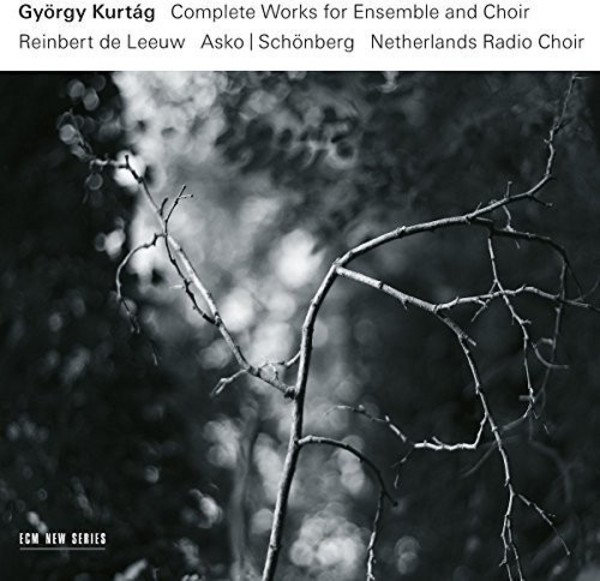
Kurtag - Complete Works for Ensemble and Choir
£22.75
In stock - available for despatch within 1 working day
Despatch Information
This despatch estimate is based on information from both our own stock and the UK supplier's stock.
If ordering multiple items, we will aim to send everything together so the longest despatch estimate will apply to the complete order.
If you would rather receive certain items more quickly, please place them on a separate order.
If any unexpected delays occur, we will keep you informed of progress via email and not allow other items on the order to be held up.
If you would prefer to receive everything together regardless of any delay, please let us know via email.
Pre-orders will be despatched as close as possible to the release date.
Label: ECM New Series
Cat No: 4812883
Format: CD
Number of Discs: 3
Release Date: 23rd June 2017
Contents
Works
...quasi una fantasia..., op.27 no.1Brefs Messages, op.47
Capriccios (4), op.9
Colinda-Balada, op.46
Double Concerto, op.27 no.2
Grabstein fur Stephan, op.15/c
Messages of the Late Miss R.V. Troussova, op.17
Samuel Beckett: What is the Word, op.30b
Songs (4) to Poems by Janos Pilinszky, op.11
Songs of Despair and Sorrow, op.18
Songs to Poems by Anna Akhmatova, op.41
Artists
Natalia Zagorinskaya (soprano)Gerrie de Vries (mezzo-soprano)
Yves Saelens (tenor)
Harry van der Kamp (bass)
Jean-Guihen Queyras (violoncello)
Elliott Simpson (guitar)
Tamara Stefanovich (piano)
Csaba Kiraly (pianino, spoken word)
Netherlands Radio Choir
Asko-Schoenberg Ensemble
Conductor
Reinbert de LeeuwWorks
...quasi una fantasia..., op.27 no.1Brefs Messages, op.47
Capriccios (4), op.9
Colinda-Balada, op.46
Double Concerto, op.27 no.2
Grabstein fur Stephan, op.15/c
Messages of the Late Miss R.V. Troussova, op.17
Samuel Beckett: What is the Word, op.30b
Songs (4) to Poems by Janos Pilinszky, op.11
Songs of Despair and Sorrow, op.18
Songs to Poems by Anna Akhmatova, op.41
Artists
Natalia Zagorinskaya (soprano)Gerrie de Vries (mezzo-soprano)
Yves Saelens (tenor)
Harry van der Kamp (bass)
Jean-Guihen Queyras (violoncello)
Elliott Simpson (guitar)
Tamara Stefanovich (piano)
Csaba Kiraly (pianino, spoken word)
Netherlands Radio Choir
Asko-Schoenberg Ensemble
Conductor
Reinbert de LeeuwAbout
Reviews
 In almost all the pieces included, from the ostensibly well-mannered …quasi una fantasia… to the kicking and raging Songs of Despair and Sorrow, we are reminded that while the music of Kurtág’s colleagues became ever more transcendent and international, he himself dug deeper into his own country’s soil and was never afraid to get mud on his shoes. A work such as Four Poems by Anna Akhmatova proves that sophistication is certainly not a casualty of that process. ... A proper treasure trove. Andrew Mellor
In almost all the pieces included, from the ostensibly well-mannered …quasi una fantasia… to the kicking and raging Songs of Despair and Sorrow, we are reminded that while the music of Kurtág’s colleagues became ever more transcendent and international, he himself dug deeper into his own country’s soil and was never afraid to get mud on his shoes. A work such as Four Poems by Anna Akhmatova proves that sophistication is certainly not a casualty of that process. ... A proper treasure trove. Andrew Mellor This magnificent, Netherlands-sourced set brings together some of Kurtág’s greatest achievements and is performed with devotional precision and commitment by the ensemble Asko | Schönberg, conducted by Reinbert de Leeuw. The title of the collection is misleading: the “ensemble” pieces all involve a solo voice or one or more instrumental soloists. ... De Leeuw, his ensemble and the Netherlands Radio Choir (in the choral works) are fabulously lucid guides. But there are outstanding solo performances, too: from the soprano Natalia Zagorinskaya in the Troussova cycle and the four Songs to Poems by Anna Akhmatova Op 41; from the mezzo Gerrie de Vries in the haunting, scena-like Samuel Beckett: What Is the Word; and from the pianist Tamara Stefanovich in … Quasi Una Fantasia ... and the double concerto. The set is fastidiously presented; ECM’s informative essays regularly put to shame the PR puffery that can masquerade as sleeve notes from the so-called major labels. Kurtág’s exquisitely precise music, wasting nothing, demands that attention. Andrew Clements
This magnificent, Netherlands-sourced set brings together some of Kurtág’s greatest achievements and is performed with devotional precision and commitment by the ensemble Asko | Schönberg, conducted by Reinbert de Leeuw. The title of the collection is misleading: the “ensemble” pieces all involve a solo voice or one or more instrumental soloists. ... De Leeuw, his ensemble and the Netherlands Radio Choir (in the choral works) are fabulously lucid guides. But there are outstanding solo performances, too: from the soprano Natalia Zagorinskaya in the Troussova cycle and the four Songs to Poems by Anna Akhmatova Op 41; from the mezzo Gerrie de Vries in the haunting, scena-like Samuel Beckett: What Is the Word; and from the pianist Tamara Stefanovich in … Quasi Una Fantasia ... and the double concerto. The set is fastidiously presented; ECM’s informative essays regularly put to shame the PR puffery that can masquerade as sleeve notes from the so-called major labels. Kurtág’s exquisitely precise music, wasting nothing, demands that attention. Andrew Clements
Error on this page? Let us know here
Need more information on this product? Click here